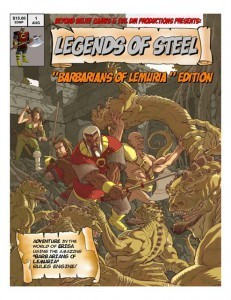date newest »
newest »
 newest »
newest »
 Hey Phil,
Hey Phil,I've played a lot of old systems, but never RuneQuest. How complex is the combat? Are there a lot of charts to cross index and feats to min/max and all that other time consuming stuff?
 Runequest is solidly rules-medium. It's much more involved than Barbarians of Lemuria, but not as complex as the recent editions of D&D/Pathfinder. I'm not a rules enthusiast, and the game is right at the sweet spot in terms of complexity; detailed enough, but not overwhelming.
Runequest is solidly rules-medium. It's much more involved than Barbarians of Lemuria, but not as complex as the recent editions of D&D/Pathfinder. I'm not a rules enthusiast, and the game is right at the sweet spot in terms of complexity; detailed enough, but not overwhelming.If you've ever played Call of Cthulhu, you've played a member of the Runequest family. It's a percentile system and almost entirely skill-based; characteristics (Strength, Dexterity, etc.) aren't used often after character creation and there are no feats.
Runequest combat is slightly more complex than in Call of Cthulhu--as it involves hit locations, limb-specific HP, and combat maneuvers (parry, riposte, bypass armor, etc)--but I find it quick and fast paced. It's fairly deadly, though, so players will want to avoid being outnumbered and keep non-combat options available. Generally no charts are necessary after character creation, but players will want a copy of the combat maneuver list.
Runequest offers a variety of magic systems in an attempt to cover all the fantasy bases (sorcery, divine, shamanic, etc.), but if you pick one or two for your particular setting and stick with them magic-related complexity can be kept to a minimum.
The new Runequest 6 by Design Mechanism is an expanded, deluxe package, but if you just want to check out the rules cheaply I'd recommend Mongoose Publishing's Legend RPG, which is available as a PDF for a dollar. It's the previous version of the Runequest rules, but released under a different title (Mongoose lost the Runequest license). It was written by the same two designers and the rules are 95% the same, if less fleshed-out in parts.
Astonishing Swordsmen and Sorcerers of Hyperborea is excellent, by the way. The rules are basically house-ruled 1st edition AD&D (which may be appealing if you're into the current "Old School Renaissance" retro-clone movement) and the setting is extremely evocative, combining Clark Ashton Smith-style weirdness with Robert E. Howard-style heroes.





I've had good luck with licensed games, since the settings are a bit more familiar and it's nice to have fiction, comics, etc., to point players to for additional background. I've run Elric using Mongoose Publishing's Runequest II system and Conan using the OGL system. I prefer Runequest's rules and Conan's setting, so my next campaign will probably use Design Mechanism's new Runequest 6 system with the setting books from the Conan RPG.
Primeval Thule looks interesting, but I'm more tempted by the new Monster Island book for Runequest 6. It has a similar premise, uses my preferred rules set, and it's out now.